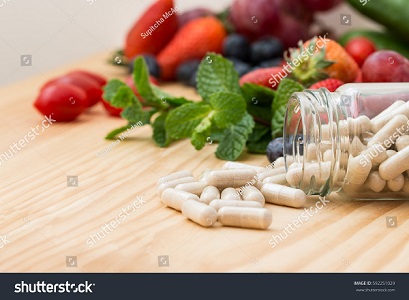The use of nutrient supplements has been very topical for some time now. Those in vogue are specific amino acids (e.g. aspartame), minerals (calcium, iron, zinc, selenium, etc.), fatty acids (e.g. fish oil, omega-3) and vitamins (A, C, E, B12, folic acid, etc.).
This fact couples with our natural desire to live longer, healthier and happier lives.
Supplements are of essence to at least four vital stakeholders: (i) consumers who demand them, (ii) industry that produces, promotes and markets them, (iii) physicians who prescribe them to their clients and (iv) research scientists and public health practitioners who study and relay timely and relevant information to society.
Some persons opt for supplements use to avoid having to eat so much food, instead of just a small pill or a spoonful of syrup, for example, in order to get the needed amount of particular nutrients (NB: Whether or not the efficiency of the utilisation of nutrients from “natural” whole food is comparable to that from “artificial” supplements is an ongoing hectic debate among nutrition scientists and public health experts worldwide).
Others use supplements because it is fashionable, probably as a result of advertisements and/or what may be in vogue socially.
Clarification
A supplement is defined as “something that you add to something else to improve it or make it complete”. The Food and Drugs Authority (FDA) defines it as “concentrated sources of nutrients or other substances produced in a pharmacological dosage form such as tablets, sachets, syrups and powders ...”.
In line with Section 118 of the Public Act 2012, Act 851, the FDA has published clear guidelines to applicants for registering food/nutritional/dietary supplements in Ghana.
For the sake of comparison, the United States FDA defines a nutrient supplement as “a preparation (usually a pill, powder or liquid) containing specific nutrients”.
Are they ‘food’?
These alone are technically not considered as (complete) “food” in the conventional sense of the word. Incidentally, many people decide to take supplements based on their intuition and/or adverts rather than any scientific considerations of the proven benefits and potential risks to their nutritional status and health.
A nutritionally adequate diet is composed of foods that meet an individual’s energy and nutrient requirements.
This usually can be achieved through eating reasonable amounts of a variety of foods as long as one has an appetite and food is available and affordable.
Nutrient needs during pregnancy and lactation are increased to an extent that it is often practically difficult to satisfy them through diet only.
Recommended iron intake in females, for example, increases from 15 milligrams (on average) per day before pregnancy to about 30 mg (i.e. about 100 per cent increase) during pregnancy.
This obviously justifies the use of supplements (especially iron, folic acid and B12) which are needed for “good blood” during this physiologically challenging period.
Potential toxicity
Nutrient supplements must provide essential nutrients. However, too much of a good thing can be bad, as is found in examples where excessive intake of specific nutrients led to serious abdominal distress, vomiting, diarrhoea, hair loss, liver damage, neurological problems, constipation, kidney failure and in a few extreme cases, death.
People’s tolerance for high doses of supplements varies just as their thresholds for deficiencies differ. Therefore, the amounts that some individuals can tolerate may not be safe for others.
Overdoses of vitamins and minerals, for example, may not appear to be a problem in Ghana now.
However, considering current trends in modernisation and adverse lifestyle changes in dietary habits, we need to be concerned.
My fundamental principle regarding nutrition is that as long as there is affordable nutritious food, and as far as I appear healthy and have appetite to eat well, my first choice should be whole food.
While healthy adult males and healthy non-pregnant, non-lactating females consuming balanced diets may not need nutrient supplements, some infants and young children, pregnant and lactating women, vegetarians, some categories of competitive athletes and elderly persons may need them.
The writer is a Harvard-trained freelance writer on science and public health matters. E-mail: wbowusu2021@gmail.com.gh

